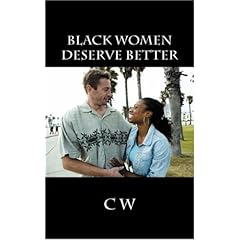
I just heard of this book by CW today. The cover pretty much sums up the depths of self-hated to which we have sunken. It's no secret that there is a gender war of sorts in the African-American community. Scores of us are verbally destroying our Brothers and Sisters in order to justify why we want to date anyone who isn't of our race. However, people who do this fail to realize that no matter how much they deride African-American (wo)men, they are pretty much shooting blanks as far as their argument is concerned. Here's why:
1. Let's just be honest. You just see European as better.
What all of these arguments come down to is a denial of racial bias. Rather acknowledging that they simply have a bias to Europeans, they put the blame on all of those of the opposite sex, saying that their in inadequacies forced them to find a mate outside their race. But anyone who is not in denial can see straight through this. We were all raised in this Euro-centric culture, so we know how you think. We were all trained to judged things by how white they are and only stop doing this when we recognize our behavior and work to correct it. But until we do, we chase after what closely matches the standard. I mean really, why choose an African-American, who doesn't come close to meeting the European Standard, when you can get the genuine item? Those who do this do not want to recognize their behavior, so in order to cover up their biases, they say that the other gender is responsible for their malicious feelings.
2. We come from the same origin.
I never understood how someone could rant about how terrible all African-American (wo)men were when we are raised in the same environments. It is not as if African-American women and men were born and raised on different planets. We grew up together in the same communities and cultures, so the bad soil that turned one of us rotten must have done the same to the other. Therefore, you can't act like the other gender is evil but yours is an innocent angel from heaven.
3. What Makes You Think the EA's Want You?
When you have so many problems with African-Americans, what makes you think that European-Americans wouldn't as well? If you don't respect African Americans, don't expect European-Americans to either.
4. Who made European-Americans demigods?
How can one find so many faults with African-Americans, but none with European-Americans at all? These African-American (wo)men bashers act as if choosing a EA for a mate will give them a flawless relationship straight out of a Disney movie and make their life complete. Their elevation of EA's to god-like perfection just illustrates their poor view of AA's. Secondly, since they love to talk about how superior EAs are a choice for mates, one must wonder what they do when talks about racism roll around. After all, it appears that EA's have more interest in AA's welfare than we do ourselves. They really have nothing to complain about.
What's truly ironic about this picture
Each time I hear someone insinuate that European-American men are better, such as in the cover of this book, the irony just sickens me. The author of this book says, "Black men are continuously being taught to disrespect, dishonor, and disregard the Black woman. The ugly, heartbreaking results manifest themselves with the 'baby mama' epidemic, video vixen mentality, enabling, denial, and other self-defeating behaviors." I agree with that statement, but what makes her think that EA men don't do the same? If your own people don't value you, why would you think that others do? In addition, who do does she think taught AA men to treat us this way? Who does she think taught us that EA women were valuable and worth protecting and reduced AA women to worthless objects? Who perpetuated, and continues to do so, this unbalanced image of EA and AA women in the media:
 Choose your loyalties wisely.
Choose your loyalties wisely.As far as AA women bashing goes, it is shameful that men would turn their back on the only ones who stuck by them after 400 years of going through pure hell. How can anyone say such nasty things about AA women when their own sister and even their own mother is one. It reminded of a passage from the Adi Granth that criticizes this behavior well if you put it into the context of AA women:
We are born of woman,
we are conceived in the womb of woman,
we are engaged and married to woman.
We make friendship with woman
and the linage continued because of woman...
we are bound with the world though woman.
We grow up stronger and wiser having drunk milk from the breast of woman.
Why should we talk ill of her,
who gives birth to Kings?
The woman is born from woman;
there is none without her.
Only the One True Lord is without woman.











